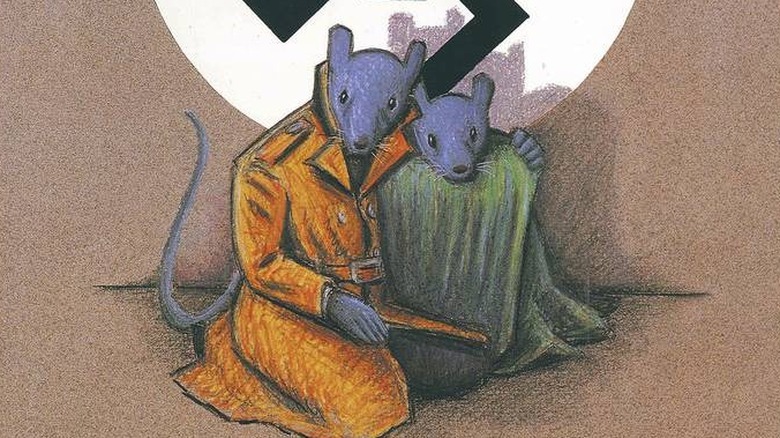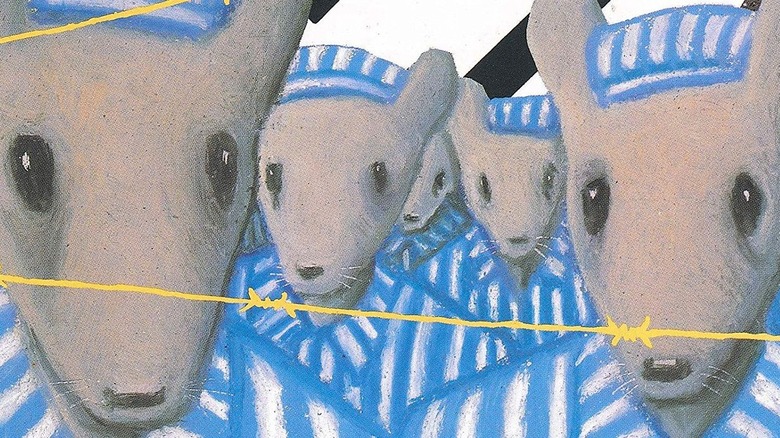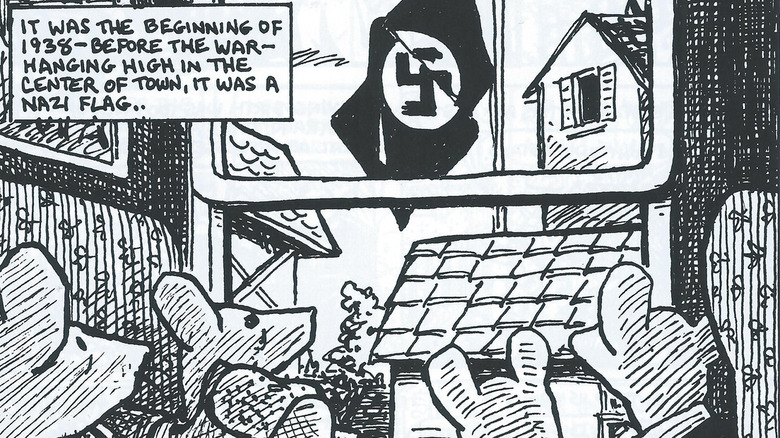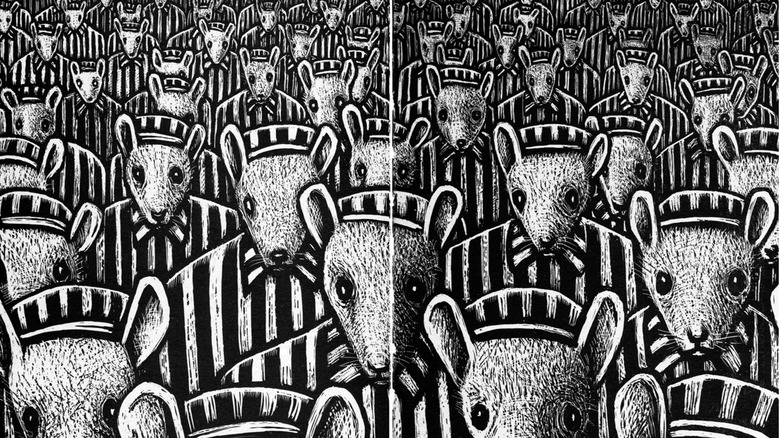Maus Creator Has No Plans To Let Anyone Adapt His Masterpiece
In January of 2022, in Tennessee, the McMinn County Board of Education voted unanimously to remove Art Spiegelman's Pulitzer Prize-winning graphic novel "Maus" from its eighth-grade curriculum. Citing foul language, the school board questioned whether or not the book's depiction of the Holocaust — an account given to the author by his father Vladek, who survived — was appropriate for 13-year-olds. The Board also wondered if there was a more genteel — my word — approach to the World War II Holocaust, positing that there are other works of historical fiction that would be more educational and perhaps less harrowing. The ban immediately attracted national attention, sparking an outcry from educators, fans, and readers that the Holocaust of World War II should perhaps not be made gentle, and that "Maus" was, in fact, an ideal educational tool in addition to being an affecting and harrowing true story.
The outcry inspired many to seek out their own copy of "Maus."
"Maus" was first published in chapters in Raw Magazine (edited by Spiegelman) starting in 1980 and finishing in 1991. It has previously been published in book form in two volumes in 1986 and '91, and then eventually came out as a full compendium. It was awarded the Pulitzer in 1992. In the weeks following the 2022 Tennessee ban of "Maus," online retailers were inundated with sales, and "Maus" quickly topped the sales charts. The old axiom is true: banning a book will only increase its popularity. "Maus" joins a long list of books that are frequently banned by school administrators, a list that includes "The Catcher in the Rye," "1984," "The Bluest Eye," "To Kill a Mockingbird," and even the "Captain Underpants" books. Indeed, the American Library Association has conducted a yearly poll, compiling which books are most frequently banned on a year-by-year basis. One of the most banned books of recent years was "George" by Alex Gino, a children's novel about a transgender girl.
Banned books are often cited as being too bawdy, or perhaps contain too many examples of racist behavior, or are too violent, or are too queer, or are too sexual. The usual cabal of Concerned Parents intermittently gather together to ban them. Despite the best efforts of censors, the books continue to be read.
The Reasons Maus Was Banned
"Maus" is an autobiographical work that details Art Spiegelman's interviews/conversations with his father Vladek, a Jewish man raised in Poland, and his father's experiences surviving life in the Auschwitz-Birkenau concentration camp during the War. "Maus" also contains sequences about the sad fate of his mother, and the author's relationship with his wife. In "Maus," all the Jewish characters are depicted as mice, while the Nazis are depicted as cats, employing classic anthropomorphic animal archetypes (derived aesthetically from George Herriman's "Krazy Kat") highlight both the cruelty and the philosophical folly of WWII.
In the McMinn County Board meeting, "Maus" was said to contain too many swear words, and depicted nude figures, too many for a 13-year-old reader. One board member didn't like that the book contained depictions of real-life Nazi war atrocities such as hangings and the murder of children. Another board member admits they didn't read "Maus," and based their ban on book reviews read online. Much of the outcry surrounding the ban on "Maus" comes from readers concerned that school boards — all over the United States — are attempting to cover up uncomfortable aspects of history. There has been a recent push from the American right wing, for instance, to ban an educational perspective called Critical Race Theory, which — to define it as briefly as possible — looks at American history and its institutions with a perspective on its racist practices. There is a palpable concern that such deliberate educational limitations are meant to give sympathies to, and bless heroism on, American history's racist figures.
"Maus" depicts Nazism as monstrous, and depicts the horrors of WWII in a frank, unflinching light. In a New York Times interview, Spiegelman explained that, yes, the imagery in "Maus" is disturbing, and deliberately so, as history itself is disturbing. On CNBC, Spiegelman called the ban Orwellian, calling the ban a censorship of Holocaust history, and that such a ban is a violation of the First Amendment. "I'm kind of baffled by this." On CNN, Spiegelman was baffled further at what the school board focused on. The board, Spiegelman observed, was focused far too keenly on the word "damn." Was that really what was going on?
To spite the ban, many have bought up copies of "Maus" for their own collections.
Maus: The Movie
According to a recent interview in The Hollywood Reporter, Spiegelman has been approached on at least four different occasions about the possibility of adapting "Maus" into a feature film. Spiegelman, now 73, has refused every time. Additionally, he has been approached about possible licensing and merchandising of "Maus" iconography, which Spiegelman has also refused. "Maus" T-shirts and collectibles certainly seems crass, given that the story is so intimate and so harrowing.
For the record, Spiegelman was willing to get a little playful with his status as a comic book auteur in an episode of "The Simpsons" wherein he, Alan Moore, and Dan Clowes — playing themselves — are depicted as muscular, shirtless vigilantes. Spiegelman puts on a mouse mask and shouts "Maus is in the house!" Later in the episode, the trio are seen merrily flying through the air, eschewing saving the Earth from a meteor to attend a benefit for underpaid comics artists of the '50s and '60s.
Despite the good natured ribbing at himself, Spiegelman has never been flippant about his seminal work. A film will never be made, according to Spiegelman. "I like movies," he said to the Hollywood Reporter, "but 'Maus' is served better as a book." He says the books "is a more intimate form and comics adhere to the brain better."
You can buy copies of "Maus" on Bookshop and other online retailers.
Could It Even Work?
Besides, could "Maus" even work as a feature film? So much of the book relies on its medium to tell the story, and throughout, Spiegelman depicts himself writing and drawing the very book we're reading. The cross-medium meta-narrative wouldn't fit so well into a feature film, unless Spiegelman wrote the screenplay as well, and the film was about the making of the film ... which would certainly be too-precious-by-half, especially in a story about the Holocaust.
So let's posit that Spiegelman's first-person narrative is abandoned in favor of a straight-up historical drama from the perspective of Vladek Spiegelman. Fans of films like "Watership Down" or "Pink Floyd: The Wall" might be able to picture a frank and disturbing animated feature that remains true to Spiegelman's art style. Given the aesthetics of "Maus," surely such a film would need to be animated by hand.
But, to Spiegelman's point, would that adhere to the brain in the same fashion? The art in comics can be stared at indefinitely, the imagery pushing its way deeper into your mind than the enforced chronology of a feature film might allow. While the wannabe-film-exec portion of our brains may be able to creatively piece together a world wherein a "Maus" feature film could be made, perhaps we should pause and ask ourselves whether one should be made.
After all, despite what educational boards in Tennessee may way, we already have it.



